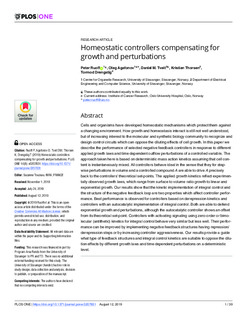| dc.contributor.author | Ruoff, Peter | |
| dc.contributor.author | Agafonov, Oleg | |
| dc.contributor.author | Tveit, Daniel Myklatun | |
| dc.contributor.author | Thorsen, Kristian | |
| dc.contributor.author | Drengstig, Tormod | |
| dc.date.accessioned | 2020-01-28T10:17:29Z | |
| dc.date.available | 2020-01-28T10:17:29Z | |
| dc.date.created | 2019-08-22T09:01:24Z | |
| dc.date.issued | 2019-08 | |
| dc.identifier.citation | Ruoff, P., Agafonov, O., Tveit, D.M. et al. (2019) Homeostatic controllers compensating for growth and perturbations. PLoS ONE 14(8):e0207831 | nb_NO |
| dc.identifier.issn | 1932-6203 | |
| dc.identifier.uri | http://hdl.handle.net/11250/2638288 | |
| dc.description.abstract | Cells and organisms have developed homeostatic mechanisms which protect them against a changing environment. How growth and homeostasis interact is still not well understood, but of increasing interest to the molecular and synthetic biology community to recognize and design control circuits which can oppose the diluting effects of cell growth. In this paper we describe the performance of selected negative feedback controllers in response to different applied growth laws and time dependent outflow perturbations of a controlled variable. The approach taken here is based on deterministic mass action kinetics assuming that cell content is instantaneously mixed. All controllers behave ideal in the sense that they for stepwise perturbations in volume and a controlled compound A are able to drive A precisely back to the controllers’ theoretical set-points. The applied growth kinetics reflect experimentally observed growth laws, which range from surface to volume ratio growth to linear and exponential growth. Our results show that the kinetic implementation of integral control and the structure of the negative feedback loop are two properties which affect controller performance. Best performance is observed for controllers based on derepression kinetics and controllers with an autocatalytic implementation of integral control. Both are able to defend exponential growth and perturbations, although the autocatalytic controller shows an offset from its theoretical set-point. Controllers with activating signaling using zero-order or bimolecular (antithetic) kinetics for integral control behave very similar but less well. Their performance can be improved by implementing negative feedback structures having repression/ derepression steps or by increasing controller aggressiveness. Our results provide a guide what type of feedback structures and integral control kinetics are suitable to oppose the dilution effects by different growth laws and time dependent perturbations on a deterministic level. | nb_NO |
| dc.language.iso | eng | nb_NO |
| dc.publisher | Public Library of Science | nb_NO |
| dc.rights | Navngivelse 4.0 Internasjonal | * |
| dc.rights.uri | http://creativecommons.org/licenses/by/4.0/deed.no | * |
| dc.subject | homeostase | nb_NO |
| dc.subject | livsvitenskap | nb_NO |
| dc.title | Homeostatic controllers compensating for growth and perturbations | nb_NO |
| dc.type | Journal article | nb_NO |
| dc.type | Peer reviewed | nb_NO |
| dc.description.version | publishedVersion | nb_NO |
| dc.rights.holder | ©2019 Ruoff et al. | nb_NO |
| dc.subject.nsi | VDP::Matematikk og Naturvitenskap: 400::Basale biofag: 470 | nb_NO |
| dc.source.pagenumber | 39 | nb_NO |
| dc.source.volume | 14 | nb_NO |
| dc.source.journal | PLOS ONE | nb_NO |
| dc.source.issue | 8 | nb_NO |
| dc.identifier.doi | 10.1371/journal.pone.0207831 | |
| dc.identifier.cristin | 1717881 | |
| cristin.unitcode | 217,8,10,0 | |
| cristin.unitcode | 217,8,4,0 | |
| cristin.unitname | Institutt for kjemi, biovitenskap og miljøteknologi | |
| cristin.unitname | Institutt for data- og elektroteknologi | |
| cristin.ispublished | true | |
| cristin.fulltext | original | |
| cristin.qualitycode | 1 | |

